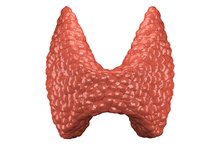How to Lose Weight in Menopause With a Low Thyroid
Also known as an underactive thyroid or hypothyroidism, the most common side effect of having a low thyroid is weight gain. In addition to this, if you are going through menopause, you may experience a heavier weight gain, so taking proper care of your body during this time is key to keeping the unwanted pounds off. With the advent of pills and supplements, there is assistance for losing weight in menopause, even with a low thyroid.
See your health-care professional to get a complete checkup done and, if you are diagnosed with hypothyroidism, your doctor should prescribe you thyroid medication which, by itself, will help you control your weight gain. You will notice within a week that you have stopped gaining weight.
Kelp Overdose Symptoms
Learn More
Exercise on a regular basis. While you might not feel much like exercising while going through menopause, proper exercise is necessary to fight many of its symptoms and side effects, such as hot flashes and weight gain.
Maintain a healthy and balanced diet. With the onset of menopause, your iron and calcium levels fall rapidly, so you need to eat a healthy diet with lots of green leafy vegetables and dairy products to maintain these levels. Eating healthy is also going to help you maintain and lose weight. Consuming fatty foods is not good for your thyroid condition, so cutting down on fats will automatically help you lose weight.
Can I Eat Seaweed If I Have Hyperthyroidism?
Learn More
Increase your water intake. Any process in your body requires a lot of water, and with the body going through menopause, your need for water increases all the more. Having more water will help you lose the weight that is stored in the form of water in your cells. Water will also flush out many toxins from the body.
Related Articles
References
- Menopause Thyroid: The Menopause Thyroid Solution
- Chiovato L, Magri F, Carlé A. Hypothyroidism in Context: Where We've Been and Where We're Going. Adv Ther. 2019;36(Suppl 2):47–58. doi:10.1007/s12325-019-01080-8
- Mullur R, Liu YY, Brent GA. Thyroid hormone regulation of metabolism. Physiol Rev. 2014;94(2):355–382. doi:10.1152/physrev.00030.2013
- Peterson CM, Thomas DM, Blackburn GL, Heymsfield SB. Universal equation for estimating ideal body weight and body weight at any BMI [published correction appears in Am J Clin Nutr. 2017 Mar;105(3):772]. Am J Clin Nutr. 2016;103(5):1197–1203. doi:10.3945/ajcn.115.121178
- Bajaj JK, Salwan P, Salwan S. Various Possible Toxicants Involved in Thyroid Dysfunction: A Review. J Clin Diagn Res. 2016;10(1):FE01–FE3. doi:10.7860/JCDR/2016/15195.7092
- U.S. Department of Health and Human Services. Physical activity guidelines for Americans. 2nd ed. 2018.
- St-Onge MP, Shechter A. Sleep disturbances, body fat distribution, food intake and/or energy expenditure: pathophysiological aspects. Horm Mol Biol Clin Investig. 2014;17(1):29–37. doi:10.1515/hmbci-2013-0066
- AlDabal L. Metabolic, Endocrine, and Immune Consequences of Sleep Deprivation. Open Respir Med J. 2011;5(1):31-43. doi: 10.2174/1874306401105010031
- Cicatiello A, Di Girolamo D, Dentice M. Metabolic Effects of the Intracellular Regulation of Thyroid Hormone: Old Players, New Concepts. Front Endocrinol (Lausanne). 2018;9. doi: 10.3389/fendo.2018.00474
Writer Bio
Charles Webb has been writing since 2000. He works as a copy editor and as the feature health-and-fitness writer for the "Pasadena Citizen." Webb has a Bachelor of Arts in journalism from the University of Houston.









